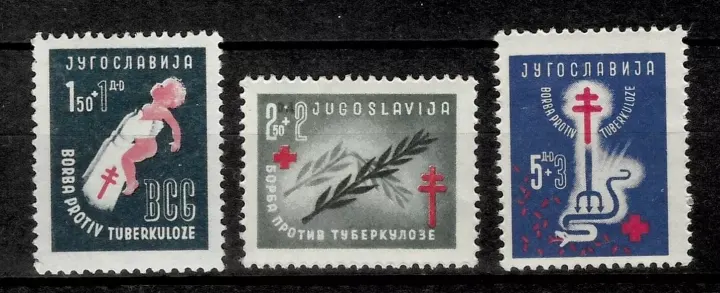Yugoslavia postage stamps year 1948 The Fight Against Tuberculosis set MNH**
Yugoslavia, like many other countries in the early to mid-20th century, faced significant public health challenges, including the fight against tuberculosis (TB). The disease was widespread in the region, particularly affecting impoverished and rural communities.
Efforts to Combat Tuberculosis in Yugoslavia:
- Pre-World War II Period:
- Tuberculosis was a major cause of mortality, especially among the working class.
- Limited healthcare infrastructure meant that TB was difficult to control.
- Some efforts were made by local governments and charities, but they were largely inadequate.
- Post-World War II Socialist Yugoslavia (1945–1990):
- Under Josip Broz Tito’s government, the fight against TB became a national priority.
- The government established a massive public health campaign that included vaccination, treatment, and public education.
- Key Strategies Implemented:
- BCG Vaccination Campaign: Large-scale immunization programs were launched, especially targeting children.
- Sanatoriums and TB Clinics: Many hospitals and specialized institutions were built to treat TB patients.
- Public Health Awareness: Educational campaigns promoted hygiene, nutrition, and early detection.
- Workplace and Housing Improvements: Better working and living conditions helped reduce TB transmission.
- International Support: Yugoslavia cooperated with organizations like the World Health Organization (WHO) to combat the disease.
- Results and Decline of TB:
- By the 1970s and 1980s, TB rates had significantly declined due to improved healthcare and living standards.
- The introduction of antibiotics such as streptomycin and isoniazid further reduced mortality rates.
- Yugoslavia became an example of a successful public health intervention in socialist states.
- Challenges After the Breakup of Yugoslavia (1990s):
- The Yugoslav Wars (1991–2001) disrupted healthcare systems, leading to a resurgence of TB in some areas.
- Economic instability and displacement of populations contributed to higher TB incidence in post-Yugoslav states.
Legacy of Yugoslavia’s Anti-TB Efforts:
The anti-TB campaigns of Yugoslavia laid the groundwork for modern public health systems in the successor states. Many of the institutions and policies established during the socialist era continue to shape TB prevention and treatment in the Balkans today.










